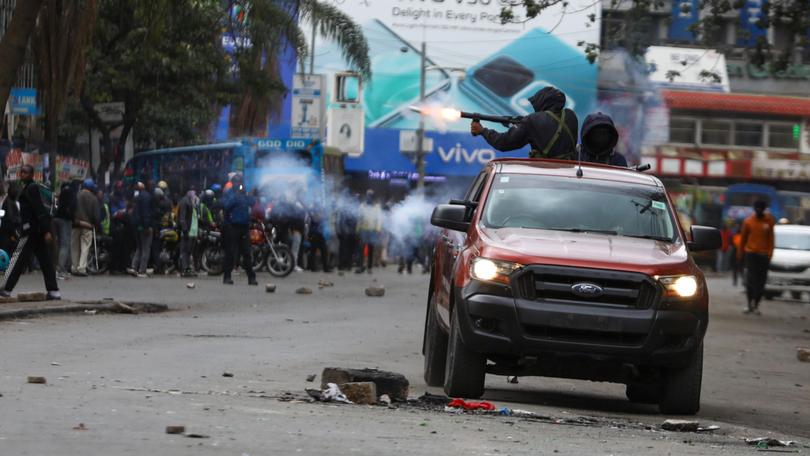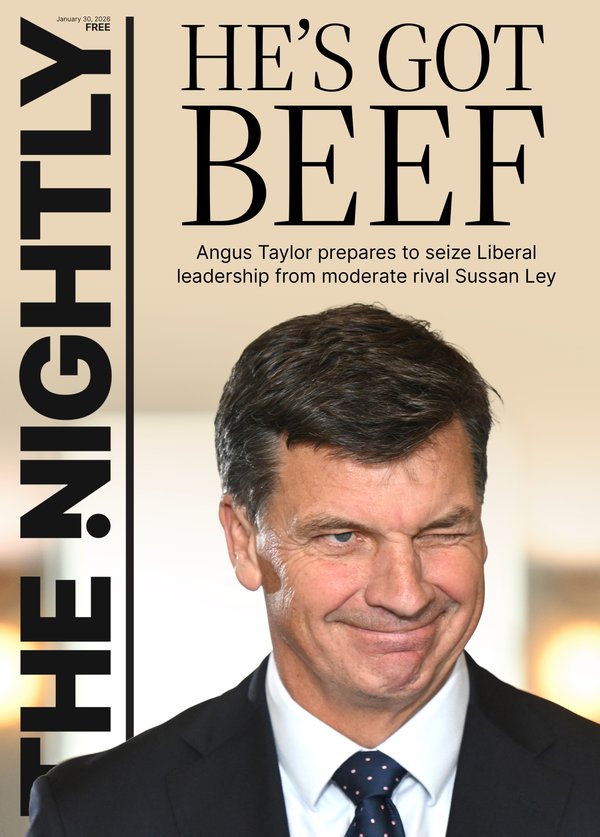Kenya police clash with protesters as tax plan dropped
Seven people have reportedly been rushed to hospital with gunshot wounds in the town of Homa Bay in western Kenya amid continuing protests against President William Ruto.

Kenyan police have fired tear gas at dozens of protesters in Nairobi and blocked off roads to the presidential palace as crowds took to the streets again across the country, even after the president bowed to pressure to withdraw a tax hike bill.
Crowds called for President William Ruto to go further and step down in the capital, Mombasa, Kisumu and other centres although the turnout was well down from the height of the mass rallies sparked by the tax measures over the past week.
Ruto withdrew the legislation including new taxes and hikes on Wednesday, a day after at least 23 people were killed in clashes at protests sparked by his plans, and parliament was briefly stormed and set alight.
Sign up to The Nightly's newsletters.
Get the first look at the digital newspaper, curated daily stories and breaking headlines delivered to your inbox.
By continuing you agree to our Terms and Privacy Policy.He is grappling with the most serious crisis of his two-year-old presidency as the youth-led protest movement has grown rapidly from online condemnations of the tax hikes into mass rallies demanding a political overhaul.
Dropping the bill has also hit plans to reduce the budget deficit and borrowing, as demanded by lenders including the International Monetary Fund.
Seven people were rushed to hospital with gunshot wounds in the town of Homa Bay in western Kenya on Thursday, Citizen TV reported, without going into further detail.
Police commander Hassan Barua said he had sent officers to check on the report.
In Nairobi, police and soldiers patrolled the streets and blocked access to State House.
Police fired tear gas to disperse several dozen people who had gathered in the centre of the city.
Doctors volunteer group Medics for Kenya said its staff at the Jamia Mosque/Crescent hospital had been hit by tear gas, and that it condemned in “the strongest terms possible violence meted out on our volunteer medical teams”.
Reuters reporters saw army vehicles on the streets after the government deployed the military to help police.
Elsewhere, hundreds of protesters gathered in the port city of Mombasa and in the western city of Kisumu, local television footage showed, although those gatherings appeared peaceful.
“We are only coming here so that our voice can be heard, us as Gen Z, us as Kenyans, we are one,” said Berryl Nelima in Mombasa.
“So the police should stop killing us, we are just peaceful protesters, we are unarmed.”
The protest movement has no formal leadership structure and has largely responded to messages, banners and slogans on social media.
Posts on Thursday suggested protest supporters were divided on how far to carry the demonstrations.
“Let’s not be foolish as we fight for a better Kenya,” Boniface Mwangi, a prominent social justice activist, said in an Instagram post.
He voiced support for demonstrations on Thursday but opposed calls to invade State House, the president’s formal offices and residence - a move that he said could spur more violence and be used to justify a crackdown.
While some protest supporters said they would not demonstrate on Thursday as the finance bill had been scrapped, others pledged to press on, saying only Ruto’s resignation would satisfy them.
In a speech on Wednesday, Ruto defended his push to raise taxes on items such as bread, cooking oil and nappies, saying it was justified by the need to cut Kenya’s high debt which has made borrowing difficult and squeezed the currency.
But he acknowledged that the public had overwhelmingly rejected the finance bill.
He said he would now start a dialogue with Kenyan youth and work on austerity measures, beginning with cuts to the budget of the presidency.
The International Monetary Fund, which has been urging the government to cut its deficit to obtain more funding, said it was closely monitoring the situation in Kenya.
“We are deeply concerned about the tragic events in Kenya in recent days,” the IMF said in a statement.
“Our main goal in supporting Kenya is to help it overcome the difficult economic challenges it faces and improve its economic prospects and the well-being of its people.”
